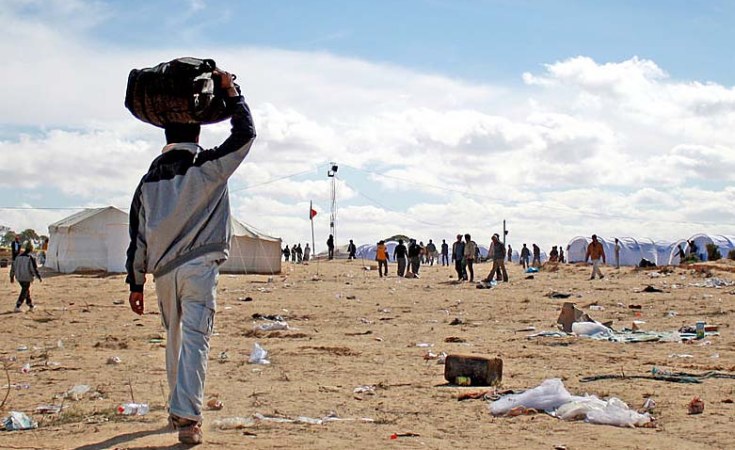In Tunisia, sub-Saharan migrants and refugees are experiencing severe hardships due to ongoing police raids. These individuals face significant challenges in accessing basic necessities, including clean water for drinking and hygiene, which puts them at risk for diseases and dehydration.
According to reports, migrants residing between Sfax and Al Amra along the coast are living in extremely harsh conditions. They are forced to stay in makeshift shelters under olive trees, with no protection from the extreme weather conditions, including the intense summer heat and cold winter temperatures. A recent video highlights their precarious situation and visible distress as they confront threats to their already tenuous living conditions.
The Tunisian National Guard is actively targeting migrants in local markets, blocking their access to essential goods like vegetables and services such as mobile phone recharging at cafes. Additionally, all forms of transportation are barred from carrying these individuals.
Reports indicate that migrants caught are promptly sent back to the borders with Algeria or Libya. This group includes over 200 children and more than 150 women who are suffering from insufficient care and protection. The majority are young people, all facing extreme difficulties and increased vulnerability in these precarious conditions.
The migrants in these regions primarily include Sub-Saharan Africans, such as Sudanese, Somalis, Ethiopians, and Eritreans, who fled challenging conditions in their home countries only to face new hardships in Tunisia.
In addition to the dire living conditions, these migrants are frequently exploited by local residents and smugglers. They endure forced labor for minimal or no wages and are subject to financial extortion by smugglers who prey on their desperation to reach Europe.

Tunisia has become a significant transit point for migrants from the Global South, driven by a combination of economic, environmental, political, and social crises. This situation is complicated by Tunisia’s efforts to leverage migration issues in its negotiations with Europe, while European migration policies continue to tighten, leaving migrants in a precarious and challenging position.
In early 2023, Tunisia’s president, Kais Saied, made a speech promoting “great replacement” theories, which are associated with far-right rhetoric in Europe. This led to a sharp increase in racially motivated violence against Black sub-Saharan Africans in Tunisia and prompted more migrants to seek refuge in Europe.
By July 2023, Tunisia and the European Union had reached an agreement involving a 900 million euro ($980 million) financial assistance package, contingent on support from the International Monetary Fund (IMF). This package included 150 million euros ($160 million) for budgetary aid, efforts to strengthen economic and trade relations, support for green energy projects, initiatives to connect people, and $115 million dedicated to addressing irregular migration.
Despite these efforts, Tunisian authorities have struggled to create a cohesive strategy for handling the influx of migrants from sub-Saharan Africa. Their current approach has been marked by inconsistent policies and harsh measures, focusing mainly on large-scale deportations of migrants and asylum seekers to isolated or border areas.

